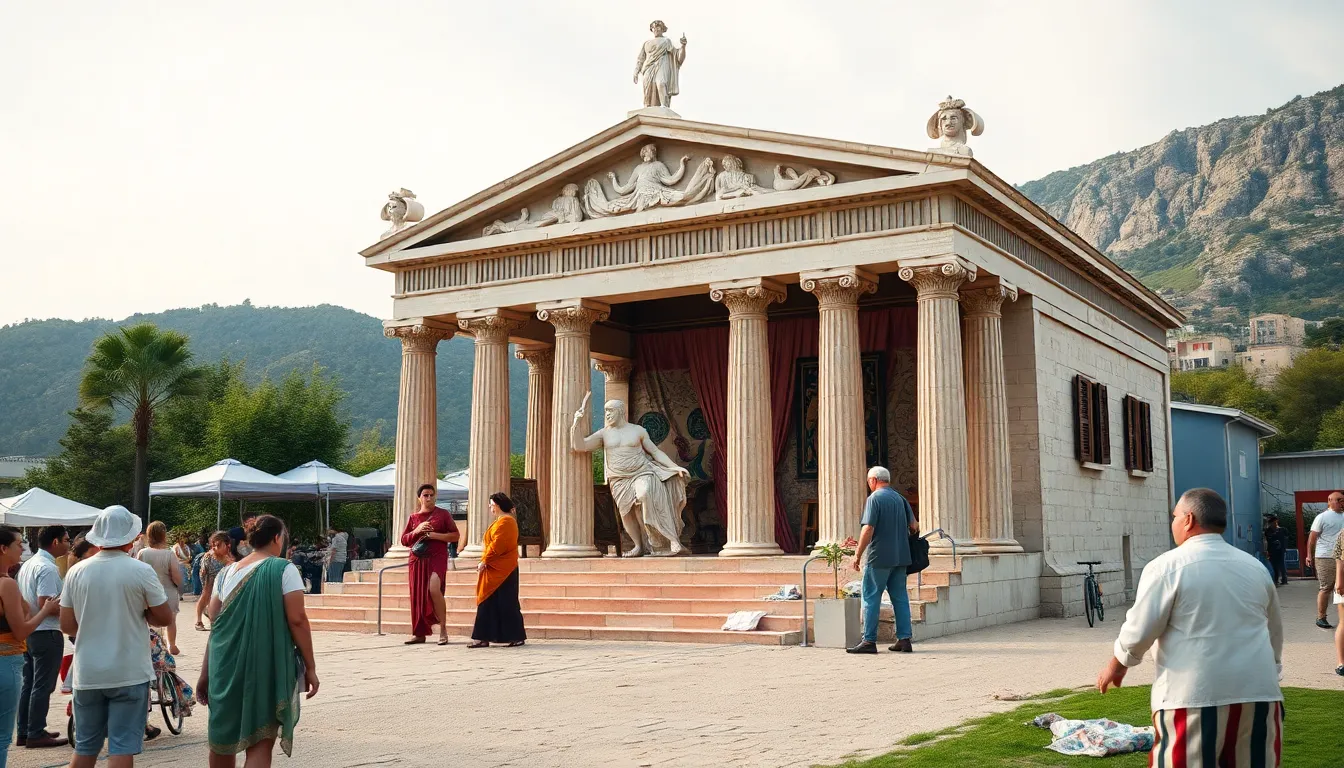The Cultural Exchange at Greek Festivals: A Melting Pot of Ideas
I. Introduction
Greek festivals are vibrant celebrations that encapsulate the essence of Greek culture, history, and community spirit. These festivities, often held in honor of deities, agricultural cycles, or historical events, serve not only as a means of cultural expression but also as a platform for cultural exchange among diverse communities.
The importance of cultural exchange in these festivals cannot be overstated. They provide an opportunity for individuals from varied backgrounds to come together, share ideas, and learn about each other’s traditions. This article delves into the rich tapestry of ideas, traditions, and practices that are shared and celebrated during Greek festivals, highlighting their role as a melting pot of cultural exchange.
II. Historical Context of Greek Festivals
The origins of Greek festivals can be traced back to ancient times, where they were often linked to religious practices and agricultural cycles. Festivals such as the Dionysia and the Panathenaea were crucial in honoring the gods and celebrating the harvest, showcasing the deep-rooted connection between spirituality and community.
Over the centuries, Greek festivals have evolved, adapting to societal changes while retaining core traditions. From ancient rituals to modern celebrations, these festivals have played a significant role in preserving Greek cultural heritage, allowing for continuity amidst change.
III. Key Features of Greek Festivals
A. Traditional food and culinary exchanges
Food is a cornerstone of Greek festivals, representing not only sustenance but also cultural identity. This section explores the culinary delights that grace these celebrations.
- Popular dishes and their significance:
- Moussaka: A layered dish of eggplant and minced meat, symbolizing the richness of Greek cuisine.
- Souvlaki: Skewered and grilled meat, often enjoyed during communal gatherings.
- Baklava: A sweet pastry made of layers of filo dough, nuts, and honey, representing the sweetness of life.
- Cooking demonstrations and workshops: Many festivals feature live cooking demonstrations where chefs share traditional recipes, encouraging attendees to engage in the culinary process.
B. Music and dance as cultural expressions
Music and dance are integral to the atmosphere of Greek festivals, serving as expressive forms of storytelling and communal joy.
- Traditional Greek music and its influences: The sounds of the bouzouki and lyre fill the air, with melodies that reflect the rich history of Greece and its interactions with other cultures.
- Dance performances and community participation: Traditional dances like the Sirtaki and Kalamatianos invite everyone to join in, fostering a sense of togetherness.
IV. The Role of Art and Craft in Cultural Exchange
Art and craft are prominently featured at Greek festivals, showcasing the talents of local artisans and providing a platform for cultural exchange.
- Visual arts and crafts showcased at festivals: Artisans display their work, ranging from pottery to textiles, often incorporating traditional methods that have been passed down through generations.
- Opportunities for local artisans and cultural exchange: Festivals often invite artisans from different backgrounds, allowing for a blend of artistic traditions and styles.
- Workshops and interactive sessions for festival-goers: Attendees can participate in crafting sessions, learning skills that enhance cultural appreciation.
V. Engaging with the Community: Inclusivity and Diversity
Greek festivals are a testament to inclusivity and diversity, welcoming participation from various cultural groups.
- Participation of different cultural groups in Greek festivals: Many festivals feature performances and booths from various ethnic communities, enriching the cultural experience.
- How festivals promote cross-cultural understanding: By sharing traditions and practices, festivals foster mutual respect and understanding among attendees.
- Initiatives to encourage inclusivity and collaboration: Organizers often implement programs aimed at involving underrepresented groups, ensuring that the festival reflects a broad spectrum of cultures.
VI. Educational Aspects of Greek Festivals
Beyond entertainment, Greek festivals serve an educational purpose, offering workshops, lectures, and discussions that deepen attendees’ understanding of Greek culture.
- Workshops, lectures, and panel discussions: These sessions provide insights into various aspects of Greek heritage, including history, language, and customs.
- Importance of educating attendees about Greek culture and history: Knowledge-sharing is key to preserving traditions and fostering appreciation.
- Collaboration with schools and universities for outreach: Many festivals partner with educational institutions to engage students and promote cultural learning.
VII. Impact of Technology on Cultural Exchange
In the digital age, technology plays a crucial role in shaping cultural exchanges at Greek festivals.
- Use of social media to promote festivals and cultural ideas: Platforms like Instagram and Facebook help spread awareness, attracting a global audience.
- Virtual participation and its effects on global audiences: Many festivals now offer virtual experiences, allowing people from around the world to engage with Greek culture.
- Future trends in cultural exchange through digital platforms: The integration of technology will likely continue to evolve, enhancing accessibility and participation.
VIII. Conclusion
The significance of cultural exchange at Greek festivals is profound, serving as a bridge that connects diverse communities and promotes understanding. These festivals not only celebrate Greek heritage but also invite people from all walks of life to share in the joy of cultural diversity.
As we embrace the richness of our diverse backgrounds, let us recognize the importance of cultural sharing and collaboration. Festivals are more than mere celebrations; they are vital in fostering community, understanding, and a shared future among all cultures.
In conclusion, Greek festivals exemplify the beauty of cultural exchange, reminding us that our differences enrich the human experience and that together, we create a vibrant tapestry of ideas and traditions.




